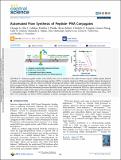Automated Flow Synthesis of Peptide–PNA Conjugates
Author(s)
Li, Chengxi; Callahan, Alex J; Phadke, Kruttika S; Bellaire, Bryan; Farquhar, Charlotte E; Zhang, Genwei; Schissel, Carly K; Mijalis, Alexander J; Hartrampf, Nina; Loas, Andrei; Verhoeven, David E; Pentelute, Bradley L; ... Show more Show less
DownloadPublished version (6.017Mb)
Publisher with Creative Commons License
Publisher with Creative Commons License
Creative Commons Attribution
Terms of use
Metadata
Show full item recordAbstract
Antisense peptide nucleic acids (PNAs) have yet to translate to the clinic because of poor cellular uptake, limited solubility, and rapid elimination. Cell-penetrating peptides (CPPs) covalently attached to PNAs may facilitate clinical development by improving uptake into cells. We report an efficient technology that utilizes a fully automated fast-flow instrument to manufacture CPP-conjugated PNAs (PPNAs) in a single shot. The machine is rapid, with each amide bond being formed in 10 s. Anti-IVS2-654 PPNA synthesized with this instrument presented threefold activity compared to transfected PNA in a splice-correction assay. We demonstrated the utility of this approach by chemically synthesizing eight anti-SARS-CoV-2 PPNAs in 1 day. A PPNA targeting the 5' untranslated region of SARS-CoV-2 genomic RNA reduced the viral titer by over 95% in a live virus infection assay (IC50 = 0.8 μM). Our technology can deliver PPNA candidates to further investigate their potential as antiviral agents.
Date issued
2022-02-23Department
Massachusetts Institute of Technology. Department of ChemistryJournal
ACS Central Science
Publisher
American Chemical Society (ACS)
Citation
Li, Chengxi, Callahan, Alex J, Phadke, Kruttika S, Bellaire, Bryan, Farquhar, Charlotte E et al. 2022. "Automated Flow Synthesis of Peptide–PNA Conjugates." ACS Central Science, 8 (2).
Version: Final published version